Gasoline is a common sight on American roadways. The sweet-smelling liquid fuels the country's cars and powers its economy. But what happens when gasoline leaks or spills? Does it stain driveways? Luckily, we research this issue to help you solve it on your own.
Gasoline will definitely stain your driveway if you spill it and don’t clean it up right away. However, the good news is that gasoline stains are relatively easy to remove with the right cleaners and a little elbow grease.
In this post, we'll discuss whether or not gas stains the driveway. We'll also reveal the tips and prevention for this case.
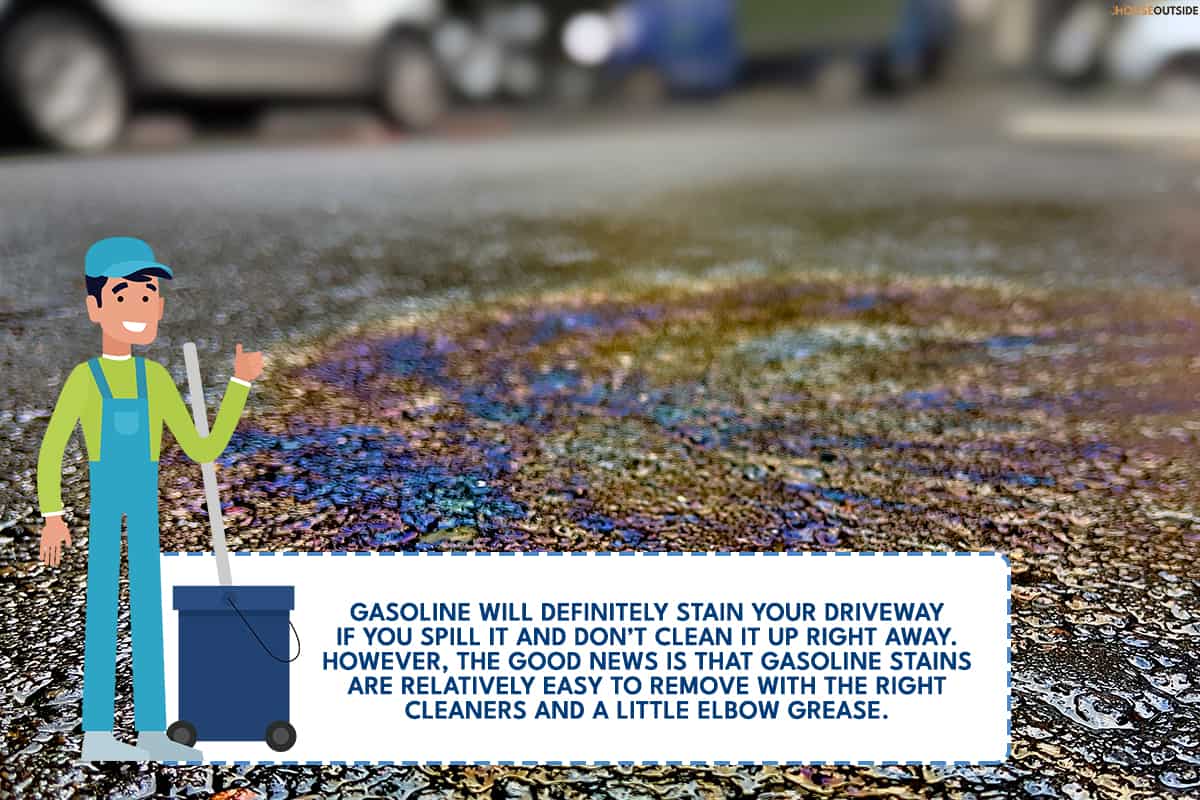
What Is Gas Staining?
Gas staining is a common problem on concrete and asphalt driveways. It occurs when gasoline or other petroleum-based products come into contact with the concrete or asphalt, causing a dark stain to form.
When a car leaks gasoline, the spilled fuel can quickly evaporate, leaving behind a telltale stain. Gasoline is a highly volatile liquid, meaning that it evaporates easily at room temperature. The evaporation process is accelerated by warm temperatures and strong sunlight.
It even leaves behind a sticky residue that can be difficult to remove. Over time, this residue will harden and form a permanent stain.
It is difficult to clean and can be unsightly, so it's important to take steps to prevent it from happening in the first place. So, gasoline and other petroleum products should never be allowed to sit on the surface of the driveway for any length of time.
What Are the Effects of Gas Staining on Driveways?
Driveways are subject to a lot of wear and tear. Over time, they can become stained and discolored from a variety of sources, including car exhaust, spilled gasoline, and oil drips. While these stains may not be permanent, they can be difficult to remove.
Gasoline, in particular, can be especially tough to get rid of. Not only does it contain harmful chemicals that can damage your driveway, but it also evaporates quickly, making it hard to remove with conventional cleaners.
What Kind of Chemicals Do You Use to Get Rid of the Gas Stains?
Though it may not seem like it, gas is actually very corrosive. Over time, it can eat away at concrete and asphalt, causing stains and damage.
Baking Soda
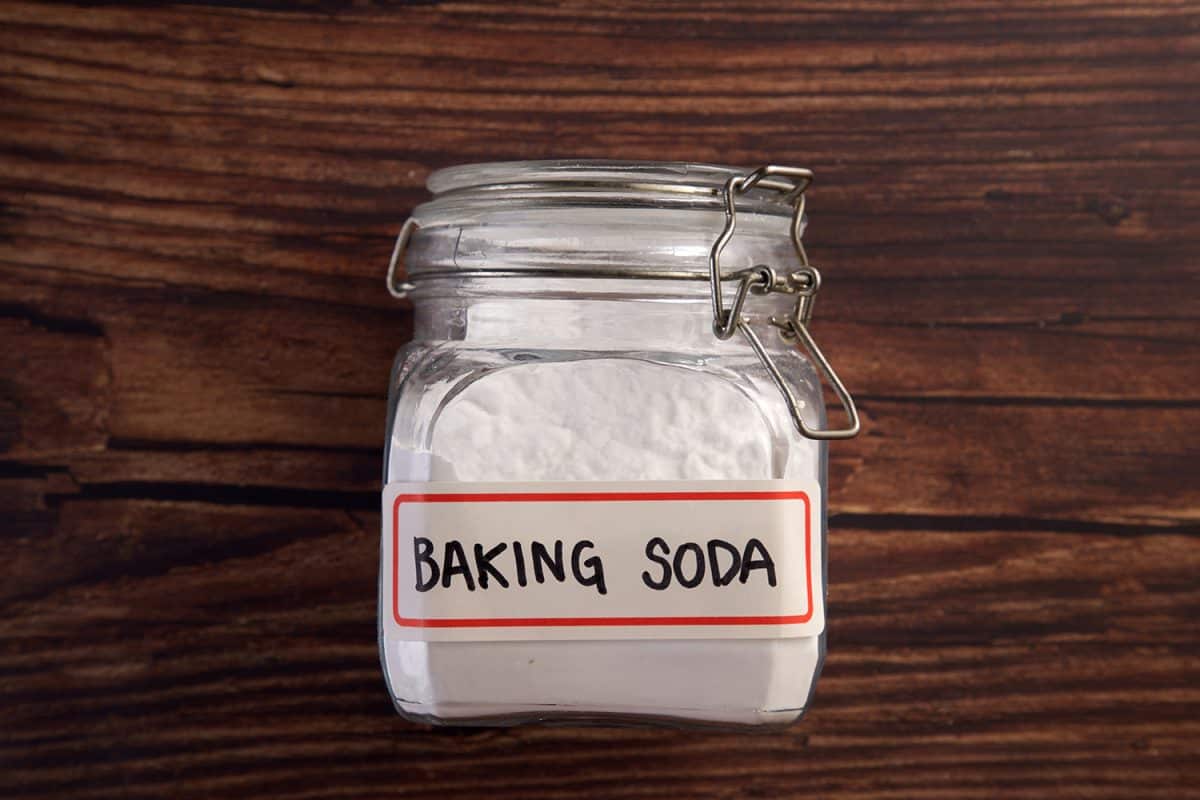
Baking soda can be used to clean a variety of surfaces, including your driveway. To remove gas stains, simply sprinkle baking soda on the affected area and scrub with a brush.
For best results, let the baking soda sit for a few minutes before rinsing with water. You may need to repeat this process for stubborn stains. In addition to being effective, baking soda is also gentle on your driveway and will not strip away any protective sealants.
Best of all, it's an inexpensive way to keep your driveway looking its best.
Powdered Dishwasher Detergent
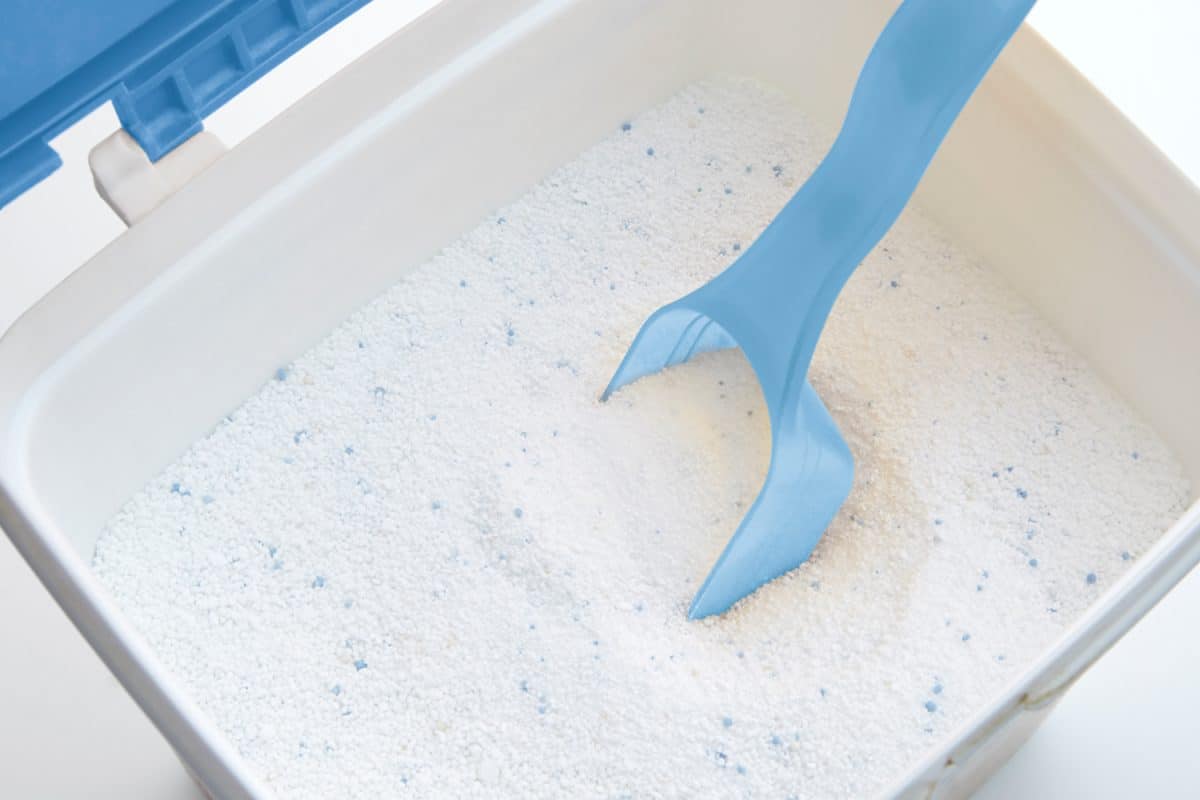
Gasoline is a highly effective solvent, and it can quickly penetrate concrete and other porous materials. Once it has soaked in, it can be nearly impossible to remove the stain without causing damage to the surface.
But then, there is one simple trick that can help to remove even the most stubborn gas stains: powdered dishwasher detergent.
Just sprinkle a generous amount of detergent on the stain and scrub with a brush or sponge. The abrasive action of the detergent will help to loosen the stain, making it much easier to remove.
You may need to repeat the process a few times for especially stubborn stains, but eventually, you should be able to get your driveway looking like new again.
Commercial Driveway Cleaner
Another option is to use a commercial driveway cleaner that is specifically designed to remove oil and grease stains. Just be sure to follow the instructions on the product label carefully, as some cleaners can be quite harsh and damage your driveway if used improperly.
Trisodium Phosphate
Trisodium phosphate, or TSP, is a heavy-duty cleaner that can be used to remove a variety of stains, including gas stains on concrete. When diluted with water, TSP can be applied to the stain with a brush or sponge.
For best results, allow the solution to sit on the stain for several minutes before rinsing it away.
TSP is a powerful cleaner and should be used with caution. Be sure to wear gloves and eye protection when using it, and avoid breathing in the fumes.
Brush and Pressure Washer
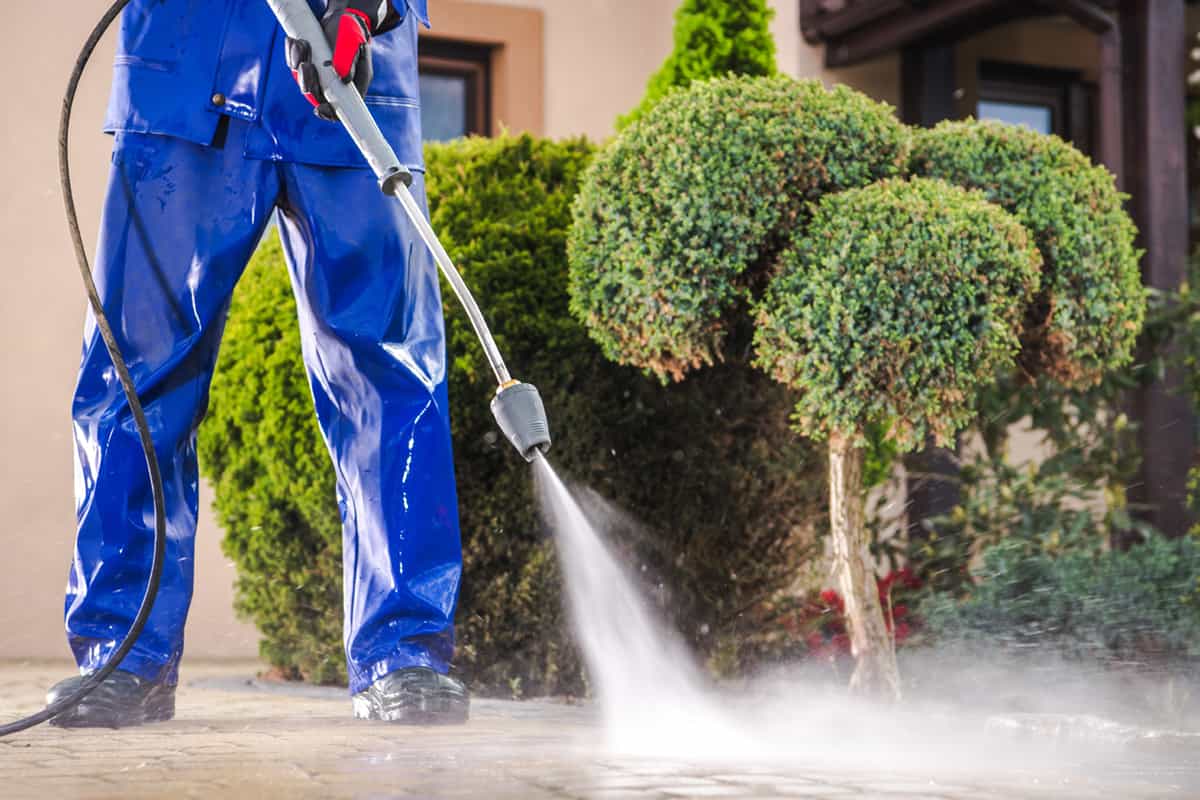
In most cases, you will need to apply the cleaner with a brush or sprayer and then scrub the affected area. Once the cleaner has had a chance to work its magic, you can simply rinse away the stain with a hose or pressure washer.
How to Remove Gas Stains in Driveways?
Removing gas stains from your driveway doesn't have to be a difficult or time-consuming task. With a little elbow grease and the right cleaners, you can have your driveway looking like new in no time. Here are five steps to removing gas stains from your driveway:
- The first step is to identify the type of concrete or paving material your driveway is made of. This will determine the most effective way to clean the stain.
- Once you know what type of material your driveway is made of, it's time to start gathering your supplies. You'll need a stiff brush, a bucket, some cleaning agent discussed earlier, and either white vinegar or bleach.
- To start cleaning, wet the affected area with water and then add a generous amount of cleaning agent stated above. Work the cleaning agent you have chosen into the stain with the brush until it forms a lather.
- Rinse away the soap with more water and then pour either white vinegar or bleach onto the stain (whichever you're using). Let it sit for 10-15 minutes before scrubbing again with the brush.
- Rinse away the cleaner with water and then let the area dry completely. If the stain is still visible, you may need to repeat steps four and five until it disappears completely. Once it's gone, enjoy your clean driveway!
What are the Prevention Tips for Keeping Your Driveway Free From Gas Staining?
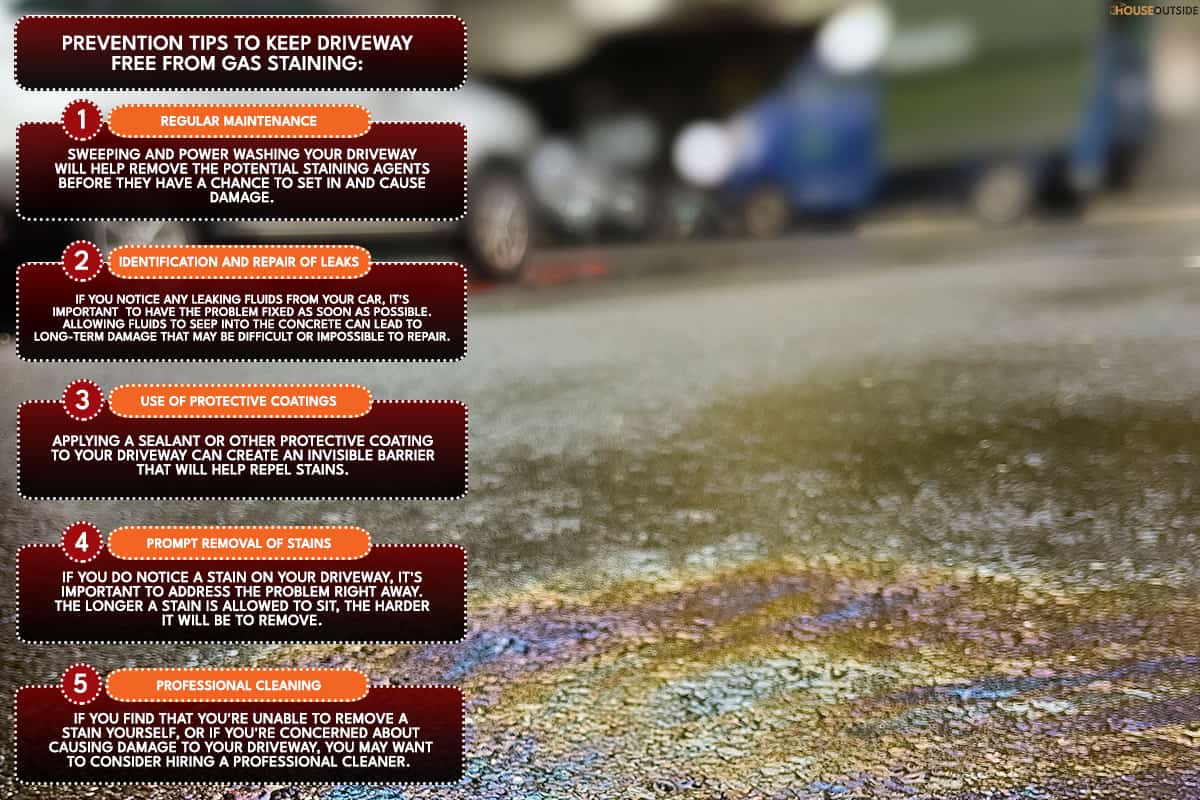
As any car owner knows, gasoline is an essential part of keeping your vehicle on the road. But what many people don't realize is that gas can also cause unsightly stains on your driveway.
Gasoline is full of harmful chemicals that can eat away at concrete, asphalt, and stone, leaving behind an ugly stain. There are a few simple things you can do to prevent gas staining on your driveway.
1. Regular Maintenance
Sweeping and power washing your driveway will help remove the potential staining agents before they have a chance to set in and cause damage. Be sure to pay special attention to any areas where oil or gas may drip from your car.
2. Identification and Repair of Leaks
If you notice any leaking fluids from your car, it's important to have the problem fixed as soon as possible. Allowing fluids to seep into the concrete can lead to long-term damage that may be difficult or impossible to repair.
3. Use of Protective Coatings
Applying a sealant or other protective coating to your driveway can create an invisible barrier that will help repel stains. This is an especially effective method if your driveway is particularly vulnerable to staining, such as if it's located under an overhang where leaves and other debris can fall and create a mess.
4. Prompt Removal of Stains
If you do notice a stain on your driveway, it's important to address the problem right away. The longer a stain is allowed to sit, the harder it will be to remove. There are a number of commercial cleaners that are specifically designed for removing oil and gas stains from concrete, so be sure to use one of these rather than a household cleaner, which may not be as effective.
5. Professional Cleaning
If you find that you're unable to remove a stain yourself, or if you're concerned about causing damage to your driveway, you may want to consider hiring a professional cleaner.
Pressure washing is an effective way to clean concrete without damaging it, and most professionals are equipped with the knowledge and equipment needed to safely and effectively remove even stubborn stains.
Final Words
Gasoline and other fuels will discolor concrete over time, but the rate of staining depends on a number of factors including the type of fuel, how it's applied, and weather conditions. The good news is that there are ways to clean them up and prevent them from happening in the first place.
For more tips above your home exterior, see our posts below:

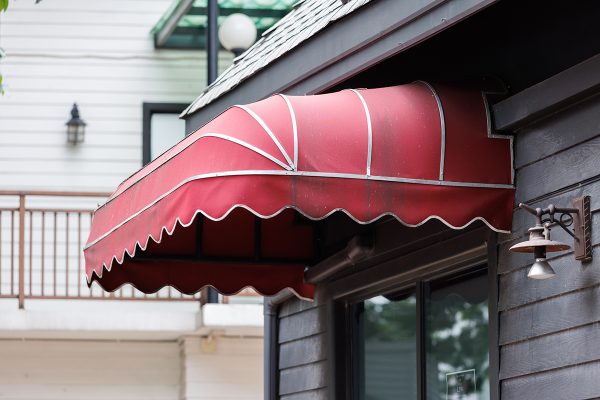
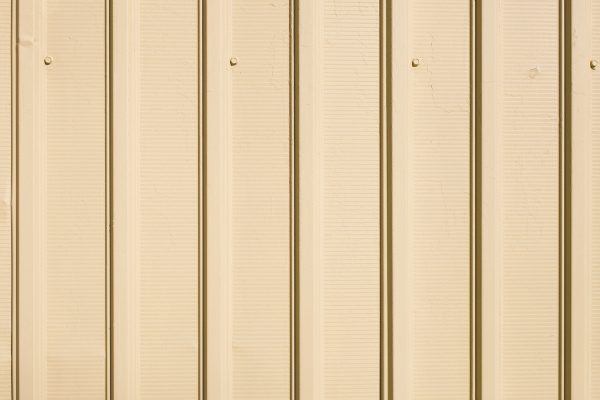
![Roof Gutter Cleaning Tips. Clean Your Gutters. Gutter Cleaning., Do Gutters Smell? [And What To Do About It]](https://houseoutside.com/wp-content/uploads/2022/10/Roof-Gutter-Cleaning-Tips.-Clean-Your-Gutters.-Gutter-Cleaning.-600x400.jpg)